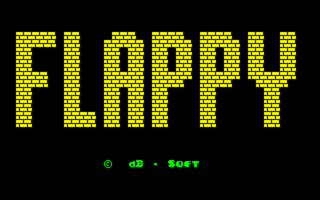Difference between revisions of "Flappy"
From NEC Retro
m (Text replacement - " Version=" to " version=") |
m (Text replacement - "| screenwidth= " to "") |
||
| Line 1: | Line 1: | ||
{{Bob | {{Bob | ||
| bobscreen=Flappy title.png | | bobscreen=Flappy title.png | ||
| − | |||
| title= | | title= | ||
| publisher=[[dB-Soft]] | | publisher=[[dB-Soft]] | ||
Revision as of 10:16, 8 January 2022
| Flappy | ||||||||||||||||||||
|---|---|---|---|---|---|---|---|---|---|---|---|---|---|---|---|---|---|---|---|---|
| System(s): PC-6001 mkII, PC-6601, PC-8801 | ||||||||||||||||||||
| Publisher: dB-Soft | ||||||||||||||||||||
| Developer: dB-Soft | ||||||||||||||||||||
| Genre: Puzzle | ||||||||||||||||||||
| Number of players: 1 | ||||||||||||||||||||
|
This short article is in need of work. You can help NEC Retro by adding to it.
Flappy (フラッピー) is a puzzle game originally developed for the Sharp X1 by dB-Soft in 1983. It was brought to other platforms in the years that followed, including the PC-6001 mkII, PC-6601, PC-8801.
Contents
Gameplay
The objective of Flappy is to move a blue stone to a highlighted "blue area", avoiding enemies and negotiating the level design, trying not to get stuck within a given time limit. The control scheme is similar to that of Boulder Dash and similar off-shoots, although there is no soil to remove and collecting items is not a priority.
| The star of Flappy is this creature, a "small boy" known as Flappy. Flappy can move in four directions but can only be hit once before losing a life. | |
| Unicorns (ユニコーン) (which do not resemble a traditional unicorn in any way) are simple creatures which can only move left or right. Their movements are quite sporadic, however - they will generally gravitate towards Flappy or the Blue Stone if either object is in range, but are otherwise unpredictable. | |
| Ebira (エビーラ) (Ebi being the Japanese term for shrimp) are more aggressive enemies which will always target Flappy, though will often struggle to negotiate scenery. | |
| The Blue Stone is what Flappy needs to move to the blue area (see below). Unlike almost everything else in this game, the blue stone is affected by gravity, but cannot be destroyed. I can be used, however, to flatten enemies should they be positioned underneath during a fall. Palette restrictions in the PC-6001 mkII version means this stone is "purple" rather than "blue" in that port. | |
| Brown stones behave identically to the blue stone, but if pushed up against a solid surface by Flappy, can be destroyed. Typically levels in Flappy require the player to move brown stones to either clear a path, or fill in a gap so that the blue stone can get by. | |
| Walls are solid obstructions which cannot be removed. | |
| The blue area is where the blue stone needs to go. In these versions of Flappy, it is just a wall painted blue. | |
| Mushrooms are projectiles which Flappy can throw (if he has picked some up). Their only use is to temporarily stun enemies by putting them briefly to sleep - Flappy will still be hurt on contact, however. |
Flappy is a notoriously hard game, as puzzles typically only have one solution and often require a quick response from the player to avoid being killed. Most versions of the game have some unique level designs - the PC-8801 version, for example, opens with a level with the letters "NEC".
History
Legacy
Flappy saw a small handful of sequels, starting with King Flappy in 1985, Flappy Limited '85 for the MSX line, Flappy 2: The Resurrection of Blue Star for the X68000 in 1989 and Flappy Special for the Game Boy in 1990. Another sequel, Ultra Flappy was planned for several systems in the mid-1990s but was cancelled for unknown reasons. No versions of Flappy have ever been released outside of Japan.
Physical scans
PC-6001 mkII version
PC-6601 version
PC-8801 version
- 1 player games
- PC-6000 series games
- PC-6000 series puzzle games
- PC-6001 mkII games
- PC-6001 mkII puzzle games
- 1984 PC-6001 mkII games
- All 1984 games
- JP PC-8801 games
- PC-8800 series games
- PC-8800 series puzzle games
- PC-8801 games
- PC-8801 puzzle games
- 1984 PC-8801 games
- JP PC-6601 games
- PC-6600 series games
- PC-6601 games
- 1984 PC-6601 games
- All games
- No non-NEC versions
- Stubs




